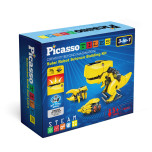We use cookies to make your experience better. To comply with the new e-Privacy directive, we need to ask for your consent to set the cookies. Learn more.
Handwriting Without Tears uses a step-by-step process in teaching the
student: demonstration, guided practice, and then independent practice. Students
will learn handwriting as well as some practical composition skills. Vital to
this program is the teaching of handwriting in a developmentally progressive
order. Coupled with this teaching are the unique multisensory tools, the distinct
letter formation techniques, and the double-line paper format.
With these methods, children learn to write in a consistent
and legible manner. Lessons take 10-15 minutes daily. Each level uses a student
book and a Teacher Guide. The Teacher Guide provides detailed directions and an explanation
of this unique methodology, with a program overview, posture instructions,
writing activity ideas, ELL strategies, and more.
Please note, the online interactive resources in the Teacher Guides are made for classroom use and are not available for homeschoolers. Currently, both the 2022 and 2025 editions of Handwriting Without Tears are available, although their components are not interchangeable. See each category description for edition distinctives. ~ Ruth



